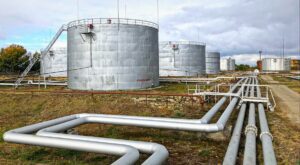
After the acquisition of Kherson Oil Transshipment Complex in early 2021, OKKO Group invested more than UAH 60 million in the reconstruction of the facility, according to a press release from the company on Tuesday.
“During this period, the company has modernized a tank farm and an oil depot, which is part of Kherson Oil Transshipment Complex, built new auto-loading points, restored a fire reservoir, etc.,” the document says.
According to OKKO Group, on the territory of the oil depot, located 4.5 km from a harbor, a new auto-loading rack with an automated control system has been built, which can serve six vehicles at the same time, as well as a new pumping station.
Since a railway track is connected to the tank farm, a railway overpass for loading into tank cars also operates on its territory.
“We received an object in which no one had invested anything for years. Thus, we faced a difficult task: to make it not only economically efficient, but also technologically safe in the shortest possible time,” Vasyl Kindiy, Head of OKKO oil terminals network, said.
According to him, the company intends to carry out significant volumes of work at Kherson Oil Transshipment Complex also in 2022. In particular, an increase in the traffic flow is expected, including due to the arrangement of infrastructure for receiving bitumen tankers.
At present, Kherson Oil Transshipment Complex is capable of receiving simultaneously two tankers with a volume of 6,500 tonnes each with a period of unloading one tanker about a day.
“But already now we can say that Ukraine has got another opportunity to fill the domestic market of petroleum products with resources from the Black Sea and Mediterranean regions,” Kindiy summed up.
The OKKO Group network has 10 own oil depots, one gas pumping station, Kherson Oil Transshipment Complex, 19 stationary and mobile laboratories for quality control of petroleum products.
The group includes a network of OKKO filling stations (Concern Galnaftogaz) – one of the largest filling networks in Ukraine, which includes 420 filling complexes.
The majority shareholder of the company is Vitaliy Antonov, among the minority shareholders is the European Bank for Reconstruction and Development.

The actual selling price of crude oil and condensate used in setting the subsoil royalty in December 2021 amounted to UAH 14,403 per tonne, which is 8.4% less than in November (UAH 15,728 per tonne).
The relevant data were published on the website of the Ministry of Economy of Ukraine.
As reported, in January 2021 the actual selling price amounted to UAH 11,114 per tonne, in February it was UAH 12,302 per tonne, in March it reached UAH 12,832 per tonne, in April it was UAH 12,605 per tonne, in May UAH 13,257 per tonne, and in June UAH 14,140, in July UAH 14,008, in August UAH 13,251 per tonne, in September UAH 14,035 per tonne, in October UAH 15,546 per tonne, and in November UAH 15,728 per tonne.

Ukraine International Airlines (UIA, Kyiv) considers a priority issue of debt restructuring to state-owned enterprises – Boryspil airport (Kyiv) and UkSATSE. “Debt restructuring for me is one of the priority tasks. On this issue, we are in the negotiation process with the state, and I see that there is a political will for a mutually beneficial solution,” CEO of the airline Yevhen Dykhne said in an exclusive interview with Interfax-Ukraine.
According to him, now the issue of the consolidated position of the state on granting powers to the leaders of Boryspil airport and UkSATSE is being worked out.
“They should receive additional powers as an act of goodwill on the part of the state to meet airlines halfway in stopping fines, penalties and restructuring debts, because today, they do not have such a right as heads of state-owned enterprises. We also need political will, which should be formalized into a government decision,” Dykhne said.
According to him, at present, UIA has disputes in courts totaling almost UAH 1.5 billion with UkSATSE and almost UAH 800 million with Boryspil airport.
“We are talking with businesses and with the government about a five-seven-year repayment schedule, because we cannot talk about another restructuring, we cannot deceive anyone. We are talking about a situation that we can serve. Our proposed audit as an attachment to this restructuring shows our ability to pay,” the CEO of UIA said.
According to Dykhne, during his work at the company neither in 2020 nor in 2021 there was no increase in debts to these state-owned enterprises, since the airline began working with them on a prepayment basis.

Ukraine International Airlines (UIA, Kyiv) plans to restore the hub model in 2022, return wide-body aircraft to its fleet, and launch long-haul flights.
“We expect an improvement in the situation in the aviation market and are preparing to restore our network model. At the same time, we want to adopt a new operating model of a three-wave hub, we want to return wide-body aircraft to the airline’s fleet and we want to restore long-haul flights. All these plans have been approved by the supervisory board, so the company headed by me is preparing to implement them,” CEO of UIA Yevhen Dykhne said in an interview with Interfax-Ukraine.
He also said that the UIA hub model will be developed in collaboration with Windrose on domestic flights throughout the country.
At the same time, according to Dykhne, UIA has no plans to become a low-cost airline.
“We are working to ensure that all issues related to cost reduction, which are so well and efficiently implemented in low-cost companies, become elements of our operational activities as much as possible, so as not to get negative feedback from our passenger, because there is a limit to savings which we, as a conventional company, cannot pass over,” he said.
Dykhne also announced UIA plans to return three long-haul Boeing 777 aircraft to the fleet.
“We have budgeted for the return of our three Boeing 777 aircraft. We flew these planes very comfortably and plan to return them to the fleet… including charter flights. But in any case, we plan to focus more on our regular program. This is New York, Toronto, Delhi,” he said.
According to Dykhne, UIA’s charter program for 2022 should balance the utilization of the fleet in order to keep the plane more in the air.
“There will probably be a number of charter programs on long-haul flights, because life in the pandemic has shown that when the closest neighbors are closed, the possibility of long-haul flights opens up. It is attractive to passengers. We are not naming destinations now, because this is a question of summer-autumn 2022. It is difficult to say which of the planned countries will be open and what will be attractive. But there will be a number of long-haul charters on Boeing 777 aircraft,” the CEO of the airline said, adding that these could be charter flights to Mexico, Thailand and other destinations.

President of Ukraine Volodymyr Zelensky signed a decree on changes in the composition of the National Investment Council on Tuesday, January 11.
According to decree No. 8/2022 published on the presidential website, Chairman of the Verkhovna Rada (by agreement) Ruslan Stefanchuk; Deputy Head of the President’s Office of Ukraine, Deputy Secretary of the Council Rostyslav Shurma; Deputy Chairman of the Servant of the People faction, Secretary of the Council (by agreement) Halyna Yanchenko were included in the staff of the National Investment Council.
Also, according to the document, Managing Partner of LV & PARTNERS (Georgia) Levan Varshalomidze (by agreement); First Deputy Prime Minister of Ukraine, Minister of Economy of Ukraine Yulia Svyrydenko were approved in the personnel of the National Investment Council:
In turn, former Minister of Economy Oleksiy Liubchenko and ex-Speaker of Parliament Dmytro Razumkov were removed from the staff of the National Investment Council by the decree.
The decree comes into force on the day of its publication.

The poor work of government agencies leads to an annual budget shortfall of about UAH 9 billion from the sale of alcoholic beverages, competent agencies in 2019-2020 and over nine months of 2021 also did not provide an effective system of control over production and circulation of alcohol and administration of the excise tax.
These results were announced by auditors of the Accounting Chamber following an audit of the planning efficiency and control over the completeness and timeliness of a receipt of the excise tax on alcoholic beverages to the state budget on the department’s website on Tuesday.
“According to the World Health Organization, the share of illegal alcohol in Ukraine is more than a third of the total alcohol market and more than half of the strong alcohol market. Taxation of illegally produced and imported alcoholic beverages only can replenish the state budget from the excise tax by about UAH 9 billion a year,” the chamber says in a report.
The Accounting Chamber refers to the data of the State Tax Service, according to which production of alcoholic beverages in 2020 increased compared to 2019 by 11%, wine – decreased by 13%, and beer – by 0.5%. At the same time, according to the State Customs Service, imports of alcoholic beverages increased by almost 45%, wine – by half, and beer – by 11%.
At the same time, in 2020, the state budget received a total of UAH 42 billion of the excise tax on imported and produced in Ukraine alcoholic beverages, however, despite the increase in imports, the share of this tax in the total amount of tax revenues decreased from 1.9% in 2018 to 1.6% over nine months of 2021.
“The State Fiscal Service, the State Tax Service and the State Customs Service did not ensure proper intersectoral coordination on administration of the excise tax on alcoholic beverages, effective control of their production and circulation. This created the preconditions for illegal production and circulation of these products and, as a consequence, for the non-receipt of this tax in the state budget,” the chamber says in the report.
In addition, due to the poor work of the Ministry of Finance and the State Fiscal Service, the automated control system Electronic Excise Stamp has not been fully implemented, since the corresponding changes have not yet been made to the Tax Code and other legislative acts. The Accounting Chamber clarified that due to the software imperfection of the system for monitoring excise tax stamps, the State Customs Service inspectors still monitor circulation of excise stamps at customs posts mainly in paper, not electronic form.
The department recalled that in 2020 the State Customs Service did not plan and did not conduct documentary field checks, since the Ministry of Finance untimely approved the planning procedure by the customs authorities. At the same time, over nine months of 2021, the State Customs Service authorities conducted only two documentary checks of exporters of alcoholic beverages, as a result of which they additionally charged UAH 2.6 million in taxes (of which 0.8% was paid to the budget).
The auditors indicated in the report that the control by the State Fiscal Service bodies over the illegal movement of alcohol and alcoholic beverages was ineffective. During the study period (2019-2020 and nine months of 2021), customs officers seized more than 158,000 liters of alcohol, over 25,000 liters of alcoholic beverages and over 2 million stamps of excise tax, however, almost 74% of the seized alcohol was returned to the owners by a court ruling. According to the Accounting Chamber, this testifies to the groundlessness of separate decisions of the customs authorities, as well as the ineffectiveness of spending funds from the state budget to pay court fees in these cases.
“Based on the results of the audit, the Accounting Chamber recommended the government to improve legislation on administration of the excise tax. In particular, to speed up the implementation of the Electronic Excise Stamp full automated system of control over circulation of alcoholic beverages and tobacco products, to improve the licensing of activities in this area, and to streamline the trade in alcoholic beverages through the Internet,” the organization says.